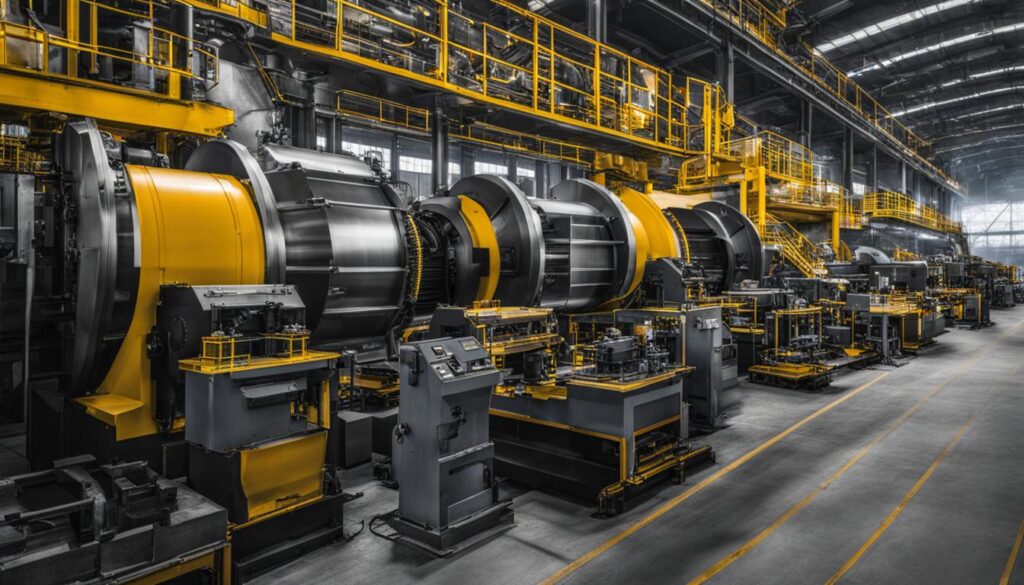Comprised of nickel and elements such as chromium, copper, iron, titanium, and molybdenum, nickel-based alloys are designed to exhibit various beneficial properties that make them indispensable in numerous industries. Notable examples of these alloys include Inconel®, Monel®, and Hastelloy®, which are popular choices for alloy steel castings. These high-performance alloys are often utilized in industries that require corrosion resistance, heat resistance, and other specialized qualities, such as aerospace, chemical processing, petroleum, electrical, and electronics. The intricate manufacturing process of these alloys involves careful selection and blending of metals followed by techniques involving melting, purification, and forming. As the demand for advanced materials grows, so does the importance of nickel alloys in modern industry.
Key Takeaways
- Nickel-based alloys, such as Inconel®, Monel®, and Hastelloy®, are essential components in various industrial sectors.
- These alloys demonstrate exceptional corrosion resistance, heat resistance, and other unique properties.
- Nickel alloys are widely used in industries such as aerospace, chemical processing, and electronics.
- The manufacturing of nickel alloys requires precise techniques, including metal blending, melting, and forming.
- The future of these advanced alloy steel castings is promising, with continued innovation in metallurgy and processing techniques.
The Versatile World of Nickel-Based Alloys
From aerospace to medicine, nickel-based alloys provide a versatile array of materials suitable for diverse applications. Ingeniously crafted, these specialty alloys like Inconel® and Monel® offer vital characteristics such as outstanding corrosion resistance, high-temperature endurance, and unique properties like shape memory and minimal expansion. Among the remarkable nickel-based superalloys, some cater to the rigorous demands of various industries, while others excel due to their distinct attributes, transforming sectors along the way.

In the realm of high-performance alloys, Inconel® and Monel® stand out as prime examples of nickel-based superalloys admired for their superior performance in challenging environments. Equally remarkable is Hastelloy®, which serves the aerospace and chemical processing sectors, propelling innovations with its extraordinary properties. As for the electrical uses, the reduced conductivity of nickel alloys compared to pure metals offers significant advantages across applications.
Indeed, the complexity of nickel alloys unveils intriguing insights into their historical development, diverse compositions, and transformative effect on industries. The table below highlights some of the most notable nickel-based alloys and their relevant applications:
| Alloy | Industry | Key Applications |
|---|---|---|
| Inconel® | Aerospace & Energy | Turbine blades, heat exchangers, pressure vessels |
| Monel® | Marine & Petrochemical | Valves, pumps, propellers, offshore platform components |
| Hastelloy® | Chemical Processing | Reactors, heat exchangers, tanks, fittings |
| Nitinol® | Medical | Stents, orthodontic archwires, surgical instruments |
Although alloy steel castings dominate in a variety of applications, the wealth of benefits and advantages offered by versatile nickel alloys remain unparalleled. While
“The whole is greater than the sum of its parts,”
each element within a nickel alloy equation contributes to unlocking a world of potential in various industries and applications.
From their rich historical roots to the modern-day innovations they foster, nickel-based alloys continue to push the boundaries of material sciences and what is possible in various industries. With each new discovery, these specialty alloys prove their unmatched versatility, showcasing their ever-growing importance in the world.
Key Characteristics That Define Nickel-Based Alloys
Nickel-based alloys have become a popular choice in several industries due to their outstanding properties. In this section, we will delve into the key features that make these materials superior: exceptional corrosion and heat resistance, unique magnetic properties and low expansion characteristics, and the challenges of machining and weldability.
Exceptional Corrosion and Heat Resistance
Nickel-chromium alloys, such as Inconel® 718, are known for their exceptional corrosion and heat resistance, making them ideal for high-temperature applications. With their ability to withstand oxidizing conditions and maintain structural integrity at temperatures as high as 980°C, these alloys have proved invaluable in industries such as aerospace, chemical processing, and marine engineering.
The corrosion resistance is not limited to oxidizing environments, as alloys like Monel® and Hastelloy® perform well in non-oxidizing salts and alkaline solutions, making them suitable for marine applications and chemical processing involving acidic compounds.
Unique Magnetic and Expansion Properties
The magnetic properties and low thermal expansion coefficients of nickel-iron alloys like Invar® make them perfect for precision instruments and shielding in electronic devices. Achieving near-zero thermal expansion coefficients, these alloys help maintain stability and performance in changing temperatures and stress conditions.
Nickel-titanium alloys, commonly known as Nitinol®, are celebrated for their shape memory abilities, which make them ideal for use in self-expanding medical devices like stents. Their resilience and adaptability under changing conditions make them invaluable in highly specialized applications.
The Challenge of Machining and Weldability
Despite their numerous advantages, machining and welding of nickel-based alloys can be challenging. Super-alloy work hardening occurs quickly in high-performance materials, complicating the machining process. Moreover, the weldability of these difficult-to-weld alloys is intricate due to their high melting points. Issues such as cracking and porosity can arise if not addressed properly.
Welding methods such as MIG or TIG welding are commonly used to work with these materials. However, they require expertise to manage the peculiarities of nickel alloys effectively.
In conclusion, the exceptional properties of nickel-based alloys make them an indispensable material in various industries. While challenges in machining and welding require special attention and expertise, the benefits these alloys offer far outweigh the complications.
Conclusion: The Future of Nickel-Based Alloys in Industry
The future of nickel-based alloys in industry appears bright, given their essential role in a wide variety of evolving industrial applications. As industries continually push the boundaries of performance in harsh environments, the demand for materials that can resist extreme corrosion and heat while retaining their functional properties is set to rise. Advanced alloy steel castings are becoming increasingly important as modern industry races to keep up with the needs of the rapidly expanding sectors such as aerospace, energy, and medicine.
Continued innovation in metallurgy and processing techniques will likely enable even greater capabilities for these materials. Researchers and manufacturers constantly work together to explore new nickel alloy compositions and uncover innovative uses for these unique materials. At the core of these discoveries lies a commitment to addressing the rigorous demands of modern industry, paving the way for a sustainable future powered by advanced technology.
As the industry moves forward, we anticipate witnessing further innovations in nickel alloys that will enhance their prevalence and effectiveness in a multitude of settings. These developments will undoubtedly have far-reaching consequences for the evolution of sectors reliant on high-performance materials. At KT-Foundry, our commitment lies in harnessing the full potential of these alloys, ensuring that they continue to meet – and surpass – the expectations of industries worldwide.
FAQ
What are some common applications of nickel-based alloys?
Nickel-based alloys are used extensively in various industries such as aerospace, chemical processing, petroleum, electrical, and electronics due to their exceptional corrosion, oxidation, and high-temperature resistance. Inconel, Monel, and Hastelloy are some popular alloys used in these applications.
How do the various elements in nickel-based alloys contribute to their properties?
Elements such as chromium, copper, iron, titanium, and molybdenum are used in nickel-based alloys to impart specific beneficial properties. For example, chromium and molybdenum provide exceptional corrosion and heat resistance, while iron and titanium contribute to unique magnetic and expansion properties.
What are some unique characteristics of nickel-based alloys?
Nickel-based alloys possess unique properties such as shape memory (Nitinol), low thermal expansion (Invar), and soft magnetic characteristics (nickel-iron alloys), which make them suitable for specialized applications in precision instruments, electronic device shielding, and self-expanding medical devices.
What challenges are faced when machining and welding nickel-based alloys?
Machining and welding nickel-based alloys can be challenging due to their rapid work-hardening and high melting points. These alloys may be difficult to machine and weld, with issues such as cracking and porosity. Techniques like MIG and TIG welding are commonly employed but require specific expertise to handle such materials effectively.
What is the future of nickel-based alloys in industry?
The future of nickel-based alloys is promising, as their critical roles in evolving industrial applications are expected to grow. Continual innovation in metallurgy and processing techniques may lead to greater capabilities for these materials, with new nickel alloy compositions and uses set to emerge in sectors such as energy, aerospace, and medicine to meet the demands of modern industry.


